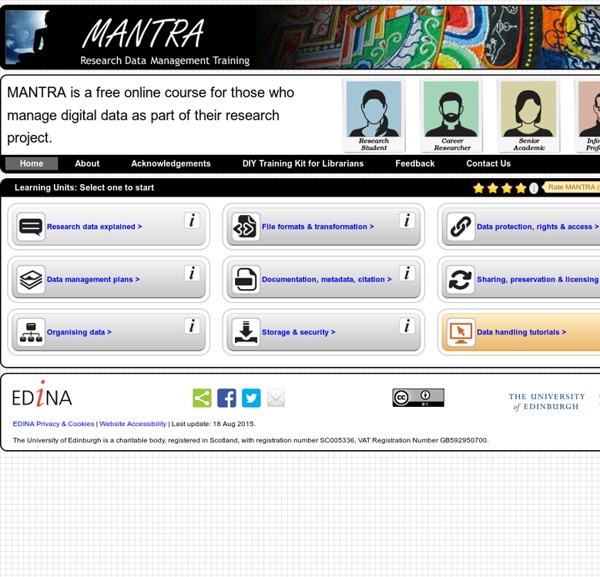



EDUCATION, TRAINING, & OUTREACH - DataFOUR (D4)--Data Federation of University Research A list of resources that provide information and tools for people interested in learning more about research data management. Curriculum Data Management, Information Literacy and DaMSSI– This collection of documents contains a final report, a mapping of RDM training projects against the "Researcher Development Framework" and "Seven Pillars of Information Literacy," and career profiles showing the relevance and utility of research data management skills to a variety of careers. DataONE - Education Modules Eleven Educational modules in PowerPoint format that cover various data management topics. DigitalPreservation in a Box – The National Digital Stewardship Alliance created a toolkit addressed to a more general audience to convey basic concepts of digital preservations, as well as resources and tools in the area. DMPToolWebinar Series – An education model targeted towards librarians and information professionals, which promote the use of the DMPTool. Workshops
Forschungsdaten.org The Science Data Literacy Project Curation Lifecycle Model (Digital Curation Centre) The model enables granular functionality to be mapped against it: to define roles and responsibilities and build a framework of standards and technologies to implement. It can be used to help identify additional steps that may be required – or actions not required by certain situations or disciplines – and to ensure that processes and policies are adequately documented. Click on the model below to find out more about specific steps or to download the Curation Lifecycle Model. ** This publication is available in print and can be ordered from our online store ** Key elements of the DCC Curation Lifecycle Model Data, any information in binary digital form, is at the centre of the Curation Lifecycle. This includes: Databases: structured collections of records or data stored in a computer system. Preservation Planning Plan for preservation throughout the curation lifecycle of digital material. Conceptualise Conceive and plan the creation of data, including capture method and storage options.
Research Data Mgmt Systems | STELLA Unconference FACILITATOR: Eugene Barsky, UBCNOTES: Michal Strutin, SCU The NSF mandate for submitting data management plans with a grant proposal is a game-changer. Yet, their mandate does not have teeth and no way to assess if data plans have been carried out. Canada will implement a similar requirement this year. How to work with faculty to meet their data needs: storage, organization, preservation. At the RDAP (Research Data Access and Preservation) Summit, they heard representatives from NOAA, NIH, etc. Will researchers be able to reuse their own data? NSF points researchers to different directorates for data management. New England Libraries have an eScience Portal and a New England eScience Day. OSTP (White House Office of Science and Technology Policy): all agencies must come out with plans to make data more available. Has anyone’s institution said, “Data management is our responsibility and we’re going to do it.”? Someone else is using ePrints. What kinds of metadata does science support?
Stanford University Libraries: Data management plans About data management plans (DMPs) A data management plan (DMP) is a written document that describes the data you expect to acquire or generate during the course of a research project, how you will manage, describe, analyze, and store those data, and what mechanisms you will use at the end of your project to share and preserve your data. You may have already considered some or all of these issues with regard to your research project, but writing them down helps you formalize the process, identify weaknesses in your plan, and provide you with a record of what you intend(ed) to do. Data management is best addressed in the early stages of a research project, but it is never too late to develop a data management plan. Requirements, examples, and review Funding agency requirements Many funding agencies require a DMP with every funding request. SPARC's Data Sharing Requirements by Federal Agency You can also consult the section below with sample agency-specific plans. Sample agency-specific plans
Education Modules | DataONE Below are links to education modules in powerpoint format that you can download and incorporate into your teaching materials. Materials are licensed as CC0 and you may enhance and reuse for your own purposes. All slides can be previewed in the embedded slideshare viewer below. We also provide 1- page synopses (with space for contact information) that can be used to promote Data Management training events at your institution. The topics covered include: Lesson 01: Why Data Management (.pptx) Trends in data collection, storage and loss, the importance and benefits of data management, and an introduction to the data life cycle. Lesson 02: Data Sharing(.pptx) Data sharing in the context of the data life cycle, the value of sharing data, concerns about sharing data, and methods and best practices for sharing data. Lesson 03: Data Management Planning(.pptx) Benefits of a data management plan (DMP), DMP components, tools for creating a DMP, NSF DMP information, and a sample DMP. Slide previews
Quartz/bad-data-guide